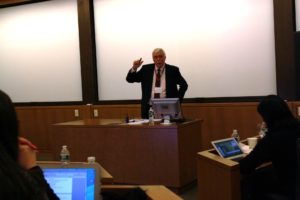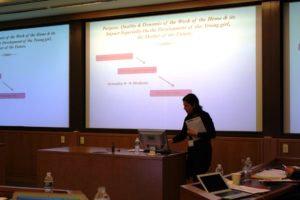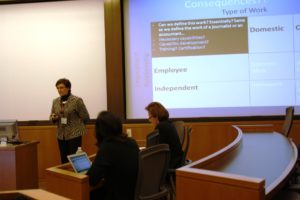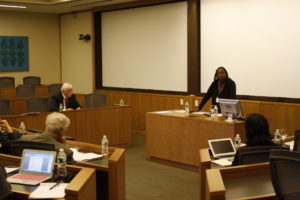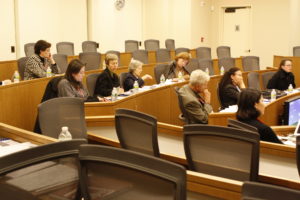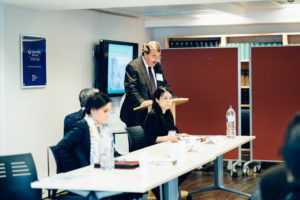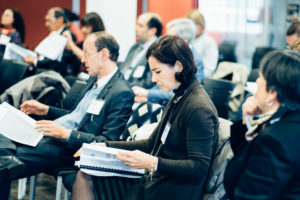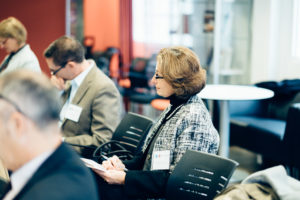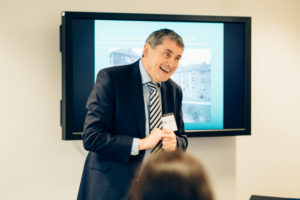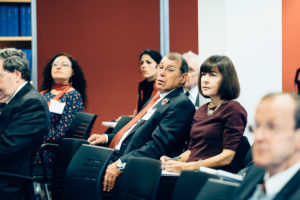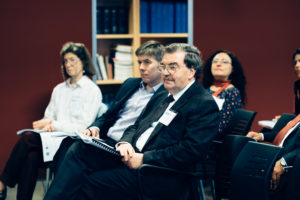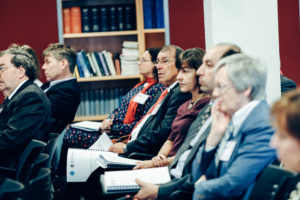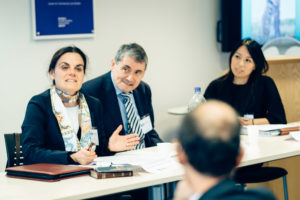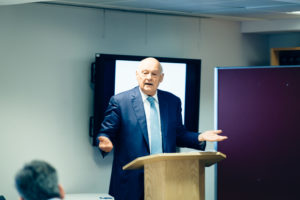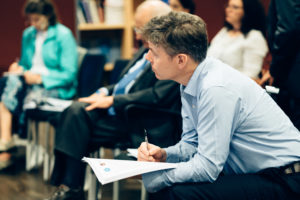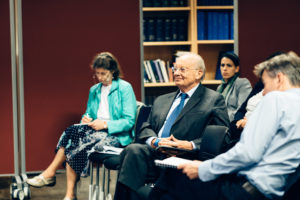On May 26th 2010 Home Renaissance Foundation hosted its annual symposium at IESE Business School, Barcelona. The symposium gathered a carefully selected audience of over 30 academics, lawyers, entrepreneurs, authors and home managers to examine three topics surrounding the work of the home: quality of life, policy-making and work-life balance. At the event three excellent speakers gave presentations based on their different areas of expertise. Professor Marta Elvira, of IESE Business School, Madrid, presented her work thus far on a study that relates quality of life for the elderly with their desire to remain in their own homes. Dr Anna Zaborska, spoke as Member for the European Parliament for Slovakia, and discussed the ways in which the Foundation’s mission and vision challenge EU policies. In the final presentation Professor Mireia de las Heras of IESE Business School, Barcelona, analysed the advantages family responsible policies in companies can have for individuals, society and the businesses themselves.
The tone set by the presentations, especially by Dr Zaborska and Professor de las Heras, was that of a call to action. Dr Elvira’s presentation set the high standard for timely research and Professor de las Heras and Dr Zaborska both followed her lead by highlighting the fundamental part research will play in the fulfillment of the Foundation’s mission as a catalyst for change.
Drawing from her experience as an MEP and as former President of the Commission of Women’s Rights for the European Parliament, Dr Zaborska testified to the need for political decision-makers and legislators to use independent scientific expertise as the basis for their decision. She continued by stressing the limitations of using GDP as the only indicator for creating policies. At a time when countries around the world are faced with the task of pulling themselves out of a recession, GDP is certainly a valuable indicator, but it should not be used in isolation. There are other important aspects of society that are not measured or taken into account by GDP but that are decisive in the stability and sustainability of our societies.
Dr Zaborska highlighted the work of the home as the most fundamental example of a service to human interdependency that is not measured by GDP. In light of this, she expressed her delight in having discovered HRF and urged the Foundation to come forward and make itself known to the European bodies in order to contribute to the establishment of new indicators, based on scientific research, that will ‘improve the quality and scope of public policies’.
In a similar vein, Professor Mireia de las Heras pointed to the flawed opinion, prevalent in many Western societies, that high achievement in the workplace, independent from external factors, such as wellbeing in other areas of a person’s life (eg. in their home life), is the key to having a successful life.
Research shows that, in fact, career success is highly influenced by elements that are external to one’s work and that not caring for family and personal life is more likely than not to have negative results on a person’s professional accomplishments. Consequently, companies’ efforts to create a work environment that fosters work-life balance for its employees have a significant effect on productivity, job satisfaction, and retention, as well as the firm’s reputation.
Because each employee, each spouse and each family are different, a company’s family-responsible policies can only work to support what must be a collective effort to attain work-life balance within a person’s individual circumstances. Here Professor de las Heras called for the need to move from merely implementing policies and programmes at a management level to inspiring a cultural change that will make work-life balance a priority in every employee’s life.
The three speakers, then, have effectively drawn out an action plan for the Foundation. Research on contemporary key issues surrounding the work of the home, as exemplified by Professor Marta Elvira’s work on quality of life for the elderly, will be the driving force that permits Home Renaissance Foundation to tackle its mission as a catalyst for change in social, political and entrepreneurial spheres.
Interview with Madame Zaborska, Member of the European Parliament for Slovakia
What was it that first drew you to advocate the work of the home?
During my time as President of the Commission of Women’s Rights at the European Parliament I organised a public hearing that shed light on the discrimination against women who freely choose not to work in formal employment sanctioned by a work permit. The main problem highlighted by this report seemed to be the fact that we have forgotten to give due recognition to the wives and mothers whose work nurtures the intergenerational bonds in society. Most of us realise that men and women – mothers, fathers and children – do not ‘recharge’ by connecting to a power outlet or ‘update’ with an internet programme as machines do.
However, we have all experienced the ‘home sweet home’ feeling a person gets when they return to their house after a long day or a trip. It makes us happy. The home, then, is the point of reference for individuals and families, and as such, it is important that we look after it and what makes it special. I can testify to the fact that political decision-makers and legislators need independent scientific expertise as the basis for their decisions and it is for this reason that I welcome the establishment of Home Renaissance Foundation with my whole heart.
You say that decision-makers and policy makers need to base their decisions on scientific research and you seem to be convinced of the value of the work of the home, how do you envisage these two convictions coming together? Do you think HRF could work with the European Parliament to promote the Foundation’s aims?
Firstly, I think we will have to change our analytical approach to perceive that there are many women who work primarily in the informal, non-paid sector. They work without receiving any acknowledgement. If policymakers do not want to hear about the work of women in the home, then it will be necessary to continue the argument from another angle and stress the economic benefits of recognising women’s work in informal commitments. The challenge for Home Renaissance Foundation, therefore, will be to use the dynamics of European policies to present an alternative way of thinking against the prevalent view that employment rate is the only measure of happiness.
We can start by turning our attention to the fact that European bodies are now discussing a political strategy for the next decade that will hopefully transform the EU into “a smart, sustainable and inclusive economy delivering high levels of employment, productivity and social cohesion.”
Of the flagship initiatives that accompany this strategy, there are a few which could be leveraged to promote the role of women and thus, support policies that uphold the work of women in the home:
A Union for innovation» aims to improve the framework conditions and access to funding for research and innovation that will ensure that innovative ideas can be turned into products and services that stimulate growth and create jobs; Youth in movement» aims to reinforce the performance of educational systems and facilitate young people’s entry into the workforce; A strategy for new skills and new jobs» aims to modernize labour markets by enabling individuals to develop their skills throughout their lives, improving participation in the labour market and establish a better balance between supply and demand of jobs, including promoting job mobility; A European platform against poverty» aims to guarantee social and territorial cohesion that will spread the benefits of growth and employment across a broad spectrum and that will give people facing poverty and exclusion the means to live with dignity and to participate actively in society.
You seem to be optimistic about the contributions HRF can make in the European Parliament. Do you think the mission and vision of HRF will be well received?
At the moment, Gross Domestic Product is considered the sole indicator of the overall development of society and progress in general in Europe. However, by its very nature and purpose it does not shed light on all the issues addressed by policy debates. These challenges underscore the need for richer indicators that are not limited to mere GDP growth. Indicators must also take social and environmental achievements into account – which is where I think HRF can make a significant contribution. I am happy to add that it seems the EU is already starting to take steps in this direction and it is financing several research projects on new indicators that reflect public concerns broader than those currently covered by GDP.
